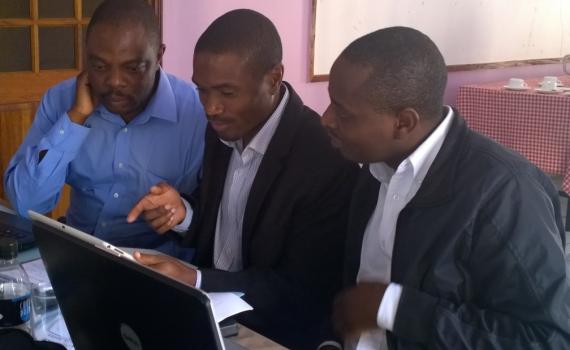
In 2006, EIFL organized the first regional open access awareness raising workshop for librarians from Southern African countries. Librarians from Malawi were among the delegates to the event in Pretoria, South Africa.
One of the earliest open access initiatives was establishment of the Malawi Research Repository, launched in 2009 by the Malawi National Commission for Science and Technology (NCST) with support from EIFL and the International Network for the Availability of Scientific Publications (INASP).
In 2009, EIFL supported the first open access workshop in the country ‘Maximizing Research Quality and Impact’, co-hosted with the Malawi Library and Information Consortium (MALICO), the Malawi Research and Education Network (MAREN) and the Southern African Regional Universities Association (SARUA). Practical sessions addressed open access policies and copyright management, including licensing open access content to encourage re-use and sharing, and recommendations on how to plan and set up an open repository.
As open access gained momentum in Malawi, the number of institutional repositories grew. The University of Malawi launched its open access repository in 2014, and since then, several more universities located in different parts of the country have launched open access repositories.
Open access policy development was slower, and valuable research, including research funded by government and donor agencies, remained inaccessible. In 2015, EIFL collaborated with MALICO on a five-month open access policy development project, ‘Developing an open access policy for Malawi’. This led to the formation of a national task force that drafted national and institutional policy templates. In 2017, EIFL supported institutional open access policy development at Mzuzu University.
In 2023, EIFL and MALICO embarked on a new project, to improve access to data and efficiency of research by building the capacity of librarians to promote research data management (RDM) in their institutions, to develop data sharing platforms and data management policies, and to train and support researchers.
TIMELINE
2006 - Ongoing
ACTIVITIES
- Raising awareness about open access and open science;
- Building open access and open science capacity of librarians, research administrators and managers, researchers and students;
- Establishing national and institutional open access repositories, and building repository management capacity;
- Developing and drafting national and institutional open science policies;
- Creating a research data librarians’ group to advocate for research data management services at their institutions, and to develop research data plans;
- Establishing research data sharing platforms in 11 institutions of higher education.
ACHIEVEMENTS
Increased availability and visibility of research in Malawi
- Development of national and institutional open access and open science policies: National task forces were set up to develop institutional and national open access and open science policy templates. Mzuzu University adopted its open access policy and a number of universities have been discussing the policy drafts.
- Establishment of institutional open access repositories: Open access repositories have been established at universities and research institutions across Malawi, including, the University of Malawi; the Malawi University of Science and Technology; the Kamuzu University of Health Sciences; Mzuzu University, and Lilongwe University of Agriculture and Natural Resources.
- Raised awareness about open science and open data: Raised awareness of university leadership, researchers, librarians and students about the benefits of open science and open data for research, teaching and learning. 11 institutions are participating in the EIFL MALICO project improve access to data and efficiency of research: University of Malawi, Malawi University of Science and Technology, Kamuzu University of Health Sciences, the Malawi University of Business and Applied Sciences, Lilongwe University of Agriculture and Natural Sciences, Mzuzu University, Catholic University, University of Livingstonia, National Commission for Science and Technology, Malawi Assemblies of God University and Adventist University.
Read more
‘Malawi: Open access & open science on the rise’, blog by Patrick Mapulanga, Librarian at Kamuzu University of Health Sciences and EIFL Malawi Country Coordinator, published on the EIFL website in celebration of the 20th Anniversary of the EIFL Open Access Programme in 2023.





